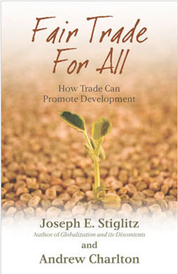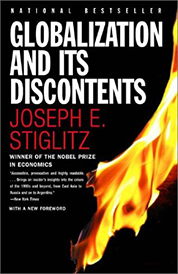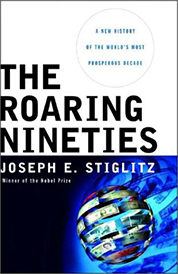Joseph E. Stiglitz was born in Gary, Indiana in 1943. A graduate of Amherst College, he received his PHD from MIT in 1967, became a full professor at Yale in 1970, and in 1979 was awarded the John Bates Clark Award, given biennially by the American Economic Association to the economist under 40 who has made the most significant contribution to the field. He has taught at Princeton, Stanford, MIT and was the Drummond Professor and a fellow of All Souls College, Oxford. He is now University Professor at Columbia University in New York, where he is also the founder and Co-President of the university's Initiative for Policy Dialogue. He is also the Chief Economist of the Roosevelt Institute. In 2001, he was awarded the Nobel Prize in economics for his analyses of markets with asymmetric information, and he was a lead author of the 1995 Report of the Intergovernmental Panel on Climate Change, which shared the 2007 Nobel Peace Prize. In 2011, Time named Stiglitz one of the 100 most influential people in the world.
Stiglitz was a member of the Council of Economic Advisers from 1993-95, during the Clinton administration, and served as CEA chairman from 1995-97. He then became Chief Economist and Senior Vice-President of the World Bank from 1997-2000. In 2008 he was asked by the French President Nicolas Sarkozy to chair the Commission on the Measurement of Economic Performance and Social Progress, which released its final report in September 2009 (published as Mismeasuring Our Lives). He now chairs a High Level Expert Group at the OECD attempting to advance further these ideas. In 2009 he was appointed by the President of the United Nations General Assembly as chair of the Commission of Experts on Reform of the International Financial and Monetary System, which also released its report in September 2009 (published as The Stiglitz Report). Since the crisis, he has played an important role in the creation of the Institute for New Economic Thinking (INET), which seeks to reform the discipline so it is better equipped to find solutions for the great challenges of the 21st century.
Stiglitz serves on numerous boards, including the Acumen Fund and Resources for the Future.
Stiglitz helped create a new branch of economics, "The Economics of Information," exploring the consequences of information asymmetries and pioneering such pivotal concepts as adverse selection and moral hazard, which have now become standard tools not only of theorists, but also of policy analysts. He has made major contributions to macroeconomics and monetary theory, to development economics and trade theory, to public and corporate finance, to the theories of industrial organization and rural organization, and to the theories of welfare economics and of income and wealth distribution. In the 1980s, he helped revive interest in the economics of R&D.
His work has helped explain the circumstances in which markets do not work well, and how selective government intervention can improve their performance.
Stiglitz's work has been widely recognized. Among his awards are more than 40 honorary doctorates, including from Cambridge and Oxford Universities. In 2010 he was awarded the prestigious Loeb Prize for this contributions to journalism. Among the prizes awarded to his books have been the European Literary Prize, the Bruno Kreisky Prize for Political Books and the Robert F. Kennedy Book Award. He is a fellow of the National Academy of Sciences, the American Academy of Arts and Sciences, the American Philosophical Society, and the Econometric Society, and a corresponding fellow of the Royal Society and the British Academy.
He has been decorated by several governments, including Colombia, Ecuador, and Korea, and most recently became a member of France's Legion of Honor (rank of Officier).






